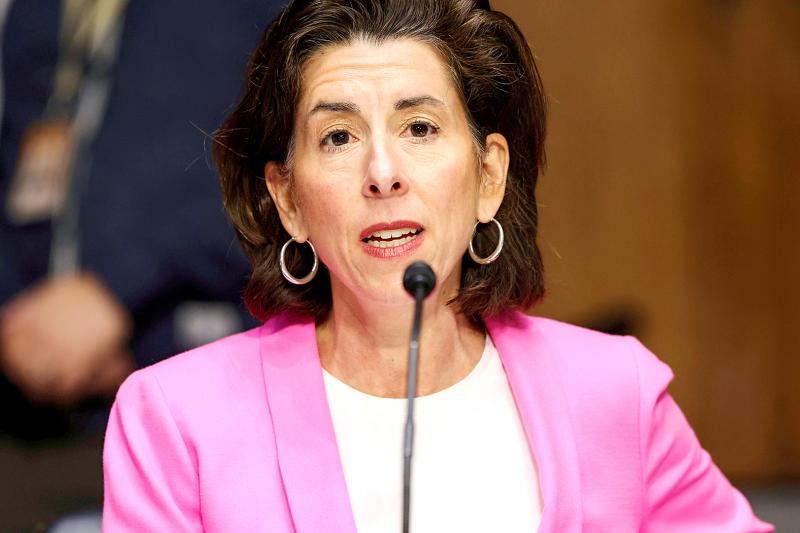US President Joe Biden’s administration is exploring how to help semiconductor producers and buyers share supply chain information to alleviate the global chip supply crisis, US Secretary of Commerce Gina Raimondo said on Thursday, urging Congress to swiftly pass legislation to fund domestic production.
“There’s a lack of transparency right now in the supply chain,” Raimondo said in a call with reporters following a day of meetings with companies. “We are trying to figure out what role the government can and should play in increasing that information sharing and forecasting so we can alleviate the short-term crunch.”
Raimondo convened executives from the biggest chipmakers, automakers and technology giants as a global semiconductor shortage weighs on those industries. The summit drew so much interest that it had to be split into two separate sessions, people familiar with the planning said.

Photo: Reuters
Among the attendees were executives from companies including Apple Inc, Alphabet Inc’s Google, Ford Motor Co, General Motors Co, AT&T Inc, Cisco Systems Inc, Verizon Communications Inc, Samsung Electronics Co, Qualcomm Inc, General Electric Co, GlobalFoundries Inc and Taiwan Semiconductor Manufacturing Co (TSMC, 台積電).
Raimondo said using the Defense Production Act, a wartime power to set priorities for certain supplies, would be “a challenge” because of the impact on a wide range of sectors.
On Monday, Raimondo is to tour a Micron Technology Inc plant in Manassas, Virginia, and is to meet with the company’s chief executive officer, Sanjay Mehrotra.
She is to be joined US senators Mark Warner and John Cornyn, two key lawmakers in the debate over chips funding and US competitiveness.
“This meeting was not about how do we fix the near term cause everybody knows that’s not something you can put a magic wand over to fix,” GlobalFoundries CEO Thomas Caulfield, who attended the meeting, said in an interview with Bloomberg News. “But let’s go do the things today that will fix this strategically, cause that’s the only thing we can do with industrial policies and governments getting involved. Everybody absolutely agreed to that.”
The meeting served as follow-up to a White House gathering last month that was attended by Biden.
Administration officials have conceded that there is not much that can be done in the short-term to address the shortage and that the focus is on a long-term strategy to avoid future shortfalls.
Raimondo and the executives discussed how the current semiconductor shortage is affecting industries; how to improve transparency in the supply chain for users of the chips; and how to use the proposed funding for semiconductor research and development to prevent shortages in the future, the people said.
Participants said they saw the meeting mainly as an opportunity to communicate their concerns to the highest level in the US government.
As part of that proposal, auto manufacturers have demanded that 25 percent of the chips produced with federal grant money be set aside for their industry.
After extensive debate, lawmakers have settled on allocating about US$2 billion for auto-grade chips.
Thursday’s meeting also comes as Biden prepared to welcome South Korean President Moon Jae-in to the White House yesterday. The US has been looking to South Korea’s advanced semiconductor industry as Washington seeks to secure supply chains in its trade battles with China.
Raimondo was yesterday to meet with South Korean Minister of Trade, Industry and Energy Moon Sung-wook on supply chain issues. The meeting is also expected to include executives of South Korean chip companies.

South Korea’s equity benchmark yesterday crossed a new milestone just a month after surpassing the once-unthinkable 5,000 mark as surging global memory demand powers the country’s biggest chipmakers. The KOSPI advanced as much as 2.6 percent to a record 6,123, with Samsung Electronics Co and SK Hynix Inc each gaining more than 2 percent. With the benchmark now up 45 percent this year, South Korea’s stock market capitalization has also moved past France’s, following last month’s overtaking of Germany’s. Long overlooked by foreign funds, despite being undervalued, South Korean stocks have now emerged as clear winners in the global market. The so-called “artificial intelligence

NEW IDENTITY: Known for its software, India has expanded into hardware, with its semiconductor industry growing from US$38bn in 2023 to US$45bn to US$50bn India on Saturday inaugurated its first semiconductor assembly and test facility, a milestone in the government’s push to reduce dependence on foreign chipmakers and stake a claim in a sector dominated by China. Indian Prime Minister Narendra Modi opened US firm Micron Technology Inc’s semiconductor assembly, test and packaging unit in his home state of Gujarat, hailing the “dawn of a new era” for India’s technology ambitions. “When young Indians look back in the future, they will see this decade as the turning point in our tech future,” Modi told the event, which was broadcast on his YouTube channel. The plant would convert

‘SEISMIC SHIFT’: The researcher forecast there would be about 1.1 billion mobile shipments this year, down from 1.26 billion the prior year and erasing years of gains The global smartphone market is expected to contract 12.9 percent this year due to the unprecedented memorychip shortage, marking “a crisis like no other,” researcher International Data Corp (IDC) said. The new forecast, a dramatic revision down from earlier estimates, gives the latest accounting of the ongoing memory crunch that is affecting every corner of the electronics industry. The demand for advanced memory to power artificial intelligence (AI) tasks has drained global supply until well into next year and jeopardizes the business model of many smartphone makers. IDC forecast about 1.1 billion mobile shipments this year, down from 1.26 billion the prior

People stand in a Pokemon store in Tokyo on Thursday. One of the world highest-grossing franchises is celebrated its 30th anniversary yesterday.